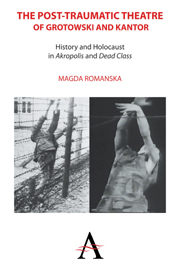 The Post-traumatic Theatre of Grotowski and Kantor
The Post-traumatic Theatre of Grotowski and Kantor Book contents
- Frontmatter
- Contents
- Foreword by Kathleen Cioffi
- Preface
- Acknowledgments
- List of Illustrations
- Introduction
- Part I Our Auschwitz: Grotowski's Akropolis
- Part II Our Memory: Kantor's Dead Class
- Chapter 22 Tadeusz Kantor: A Very Short Introduction
- Chapter 23 Dead Class: The Making of the Legend
- Chapter 24 Dead Class in Poland
- Chapter 25 The Polish History Lesson
- Chapter 26 Dead Class Abroad
- Chapter 27 On Not Knowing Polish, Again
- Chapter 28 The Visual and the Puerile
- Chapter 29 The National and the Transnational
- Chapter 30 Witkiewicz's Tumor
- Chapter 31 An Age of Genius: Bruno Schulz and the Return to Childhood
- Chapter 32 Conversing with Gombrowicz: The Dead, the Funny, the Sacred and the Profane
- Chapter 33 Panirony: “A pain with a smile and a shrug”
- Chapter 34 Raising the Dead
- Chapter 35 Dead Class as Kaddish…
- Chapter 36 Dead Class as Dybbuk, or the Absence
- Chapter 37 The Dead and the Marionettes
- Chapter 38 Men and Objects
- Chapter 39 Dead Class as Forefathers' Eve
- Chapter 40 Dead Class: The Afterlife
- Postscript
- Appendix
- Notes
- Bibliography
- Index
Chapter 34 - Raising the Dead
from Part II - Our Memory: Kantor's Dead Class
- Frontmatter
- Contents
- Foreword by Kathleen Cioffi
- Preface
- Acknowledgments
- List of Illustrations
- Introduction
- Part I Our Auschwitz: Grotowski's Akropolis
- Part II Our Memory: Kantor's Dead Class
- Chapter 22 Tadeusz Kantor: A Very Short Introduction
- Chapter 23 Dead Class: The Making of the Legend
- Chapter 24 Dead Class in Poland
- Chapter 25 The Polish History Lesson
- Chapter 26 Dead Class Abroad
- Chapter 27 On Not Knowing Polish, Again
- Chapter 28 The Visual and the Puerile
- Chapter 29 The National and the Transnational
- Chapter 30 Witkiewicz's Tumor
- Chapter 31 An Age of Genius: Bruno Schulz and the Return to Childhood
- Chapter 32 Conversing with Gombrowicz: The Dead, the Funny, the Sacred and the Profane
- Chapter 33 Panirony: “A pain with a smile and a shrug”
- Chapter 34 Raising the Dead
- Chapter 35 Dead Class as Kaddish…
- Chapter 36 Dead Class as Dybbuk, or the Absence
- Chapter 37 The Dead and the Marionettes
- Chapter 38 Men and Objects
- Chapter 39 Dead Class as Forefathers' Eve
- Chapter 40 Dead Class: The Afterlife
- Postscript
- Appendix
- Notes
- Bibliography
- Index
Summary
Although Dead Class makes no direct reference to Auschwitz, it relives the anguish of the Holocaust, which returns as flashes and bits of haunting memory: “Kantor negates both physical presence and the present, concluding that only thought and memory are important.” Thus, the references to the Holocaust are hidden behind the script and the visual landscape; they are and are not there, both visible and invisible. Memory is important because after a traumatic event, one lives only in memory, dwelling in the moment of trauma, reliving it over and over again. That is why the circular structure of Dead Class is important: the pupils parade round and round, always returning to the same point in time and space; they become lively and excited in one moment, only to dissolve in desperate cries in the next. There is a horrifying compulsion in those gestures. Repeated continuously, they become absurd and devoid of meaning. The characters seem to be stuck, unable to move on, to go forward, as if they are stuck in the moment of trauma and lost in it forever. Tish Dace vividly describes the experience: “The identity of the characters and the significance of their activities seems far less important than the compulsions; and the nightmare quality of their experiences – together with an occasional garish bit of humor – infects our psyches so forcibly that Kantor's precise intentions don't much matter.” Although Kantor occasionally allows characters to rebel and free themselves from their baggage, they are unable to free themselves from the objects’ hegemony.
- Type
- Chapter
- Information
- The Post-traumatic Theatre of Grotowski and KantorHistory and Holocaust in 'Akropolis' and 'Dead Class', pp. 252 - 255Publisher: Anthem PressPrint publication year: 2012


